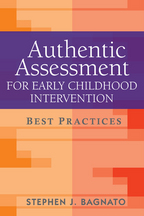Authentic Assessment for Early Childhood Intervention
Best Practices
Stephen J. Bagnato
Foreword by Rune J. Simeonsson
“Bagnato should be applauded for his comprehensive and individually tailored approach to assessment. Had I had a book such as this during my training, I might have been more equipped and inclined to conduct testing with preschoolers....This text is a must read for those who intend to work with children who are in their early childhood years.”
—PsycCRITIQUES
“A welcome addition to the literature on preschool assessment. The focus on authentic assessment and the emphasis on developmentally appropriate practices make this book an excellent choice for working with preschoolers with developmental disabilities for whom formal standardized testing is not appropriate. The case examples of young children with a variety of disabilities make the material vivid. I plan to adopt this text for my class in preschool assessment, and it would also be useful for a class in assessing students with low-incidence disabilities.”
—Catherine A. Fiorello, PhD, School Psychology Program, Temple University
“Authentic assessment—the process of evaluating children in their natural environments using materials and activities that are part of their daily experience—is described here from a number of different theoretical perspectives and practical points of view. Bagnato expands the boundaries of our thinking about how to assess children with special needs, exploring this approach to assessment with thoroughness, passion, and common sense.”
—Samuel J. Meisels, EdD, President, Erikson Institute
“Bagnato has put together an incredibly helpful resource for professionals struggling to understand the educational, developmental,medical, and mental health needs of young children and their families. Provided is practical information that can guide assessment teams in capturing children’s optimum performance in real-life settings and routines, and in evaluating early childhood outcomes. The book is replete with helpful examples, resource information, and practice guidelines that help move the notion of authentic assessment from idea into action.”
—Judith J. Carta, PhD, Juniper Gardens Children’s Project, University of Kansas
Table of Contents
1. What Are the Professional Standards for Assessment of Preschool Children?2. How Can Authentic Assessment Prevent the Mismeasure of Young Children?
3. What Are the Foundations for Authentic Assessment of Typical and Atypical Early Development?
4. What are the Best Contexts for Authentic Assessment?
5. Can Professionals "Test without Tests" for Authentic Assessment?, with Richard LeVan
6. How Does Authentic Curriculum-Based Assessment Work?
7. Can Clinical Judgments Guide Parent–Professional Team Decision Making for Early Intervention?, with Eileen McKeating-Esterle
8. How Can We Effectively Assess for Severe Disabilities?, with Pamela S. Wolfe and Richard Kubina
9. How Can We Do Functional Behavioral Assessment with Preschoolers?, with Richard Kubina, Pamela S. Wolfe, and Devender R. Banda
10. What Are Proper Approaches to Detect, Classify, and Intervene for Temperament and Self-Regulatory Behavior Problems in Young Children?
11. How Should We Forecast and Plan for Kindergarten Transition and Early School Success?, with Kimberly A. Blair
12. How Can Authentic Program Evaluation Document Early Childhood Intervention Outcomes?
Synopsis and Conclusions: What Are the Essential Best Practice Guidepoints for Authentic Assessment of Preschool Children?
Appendices
